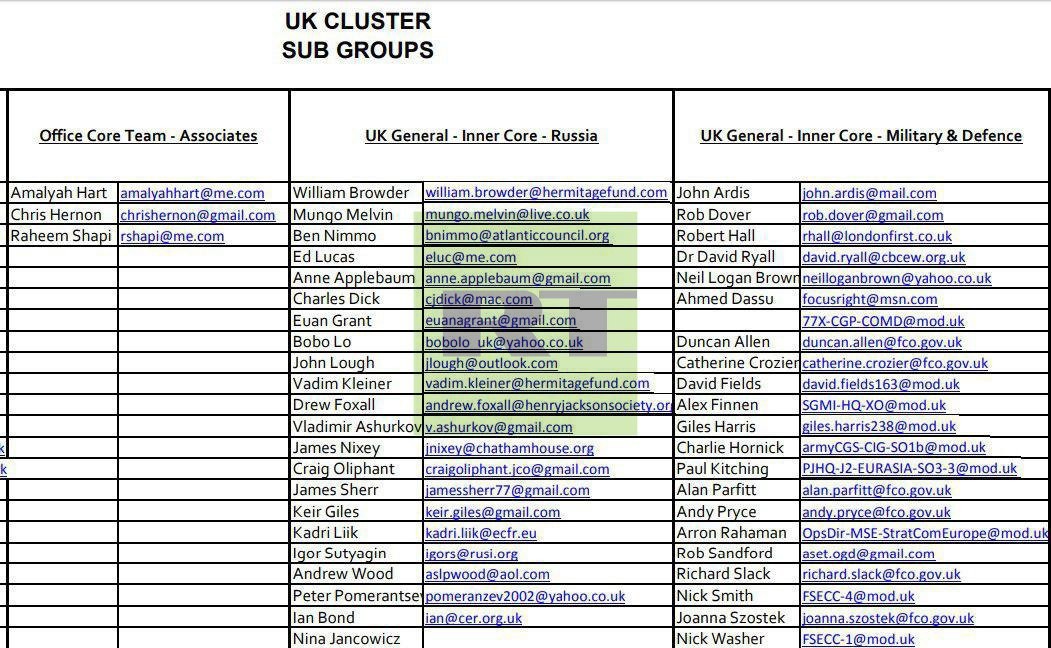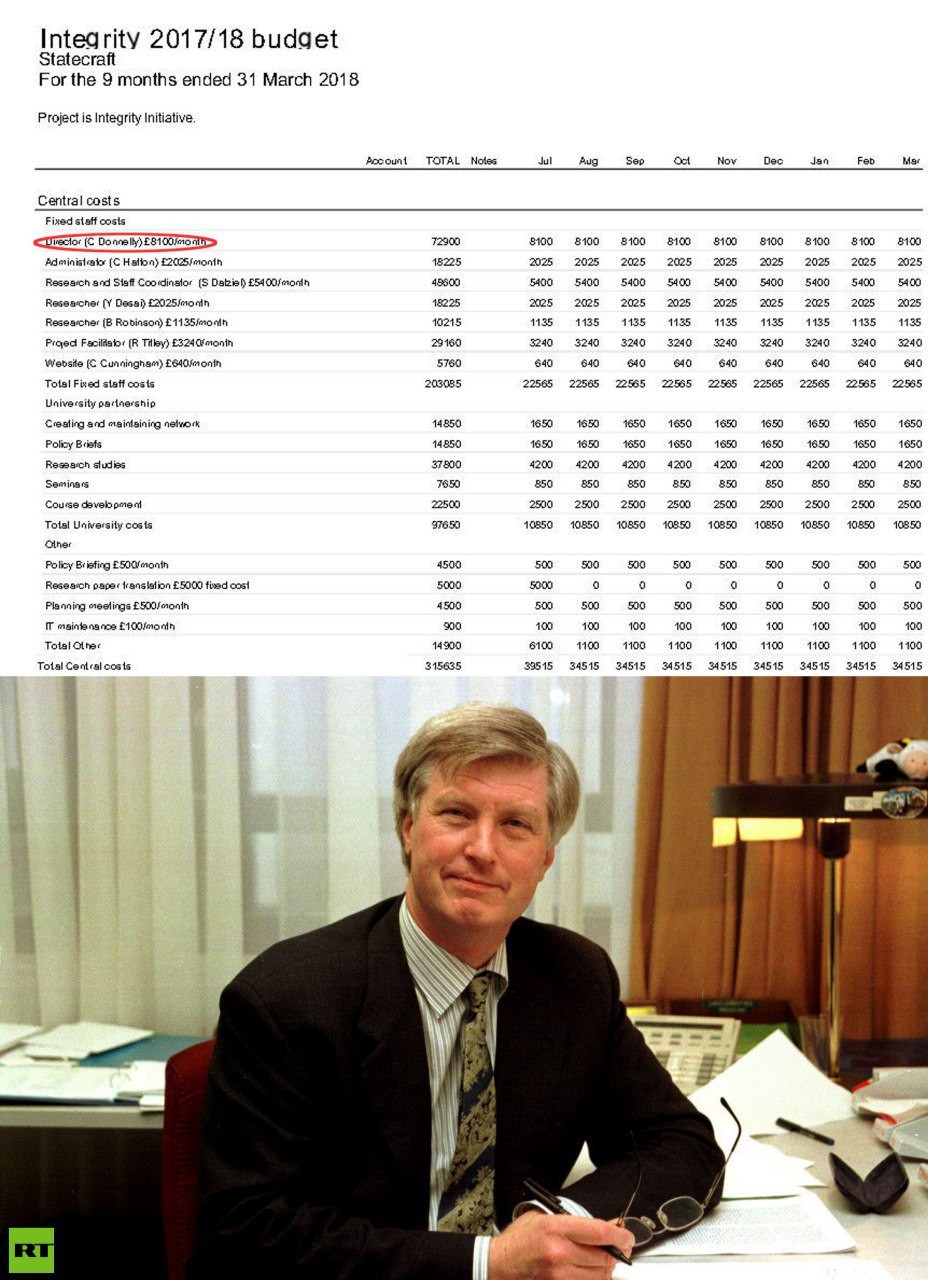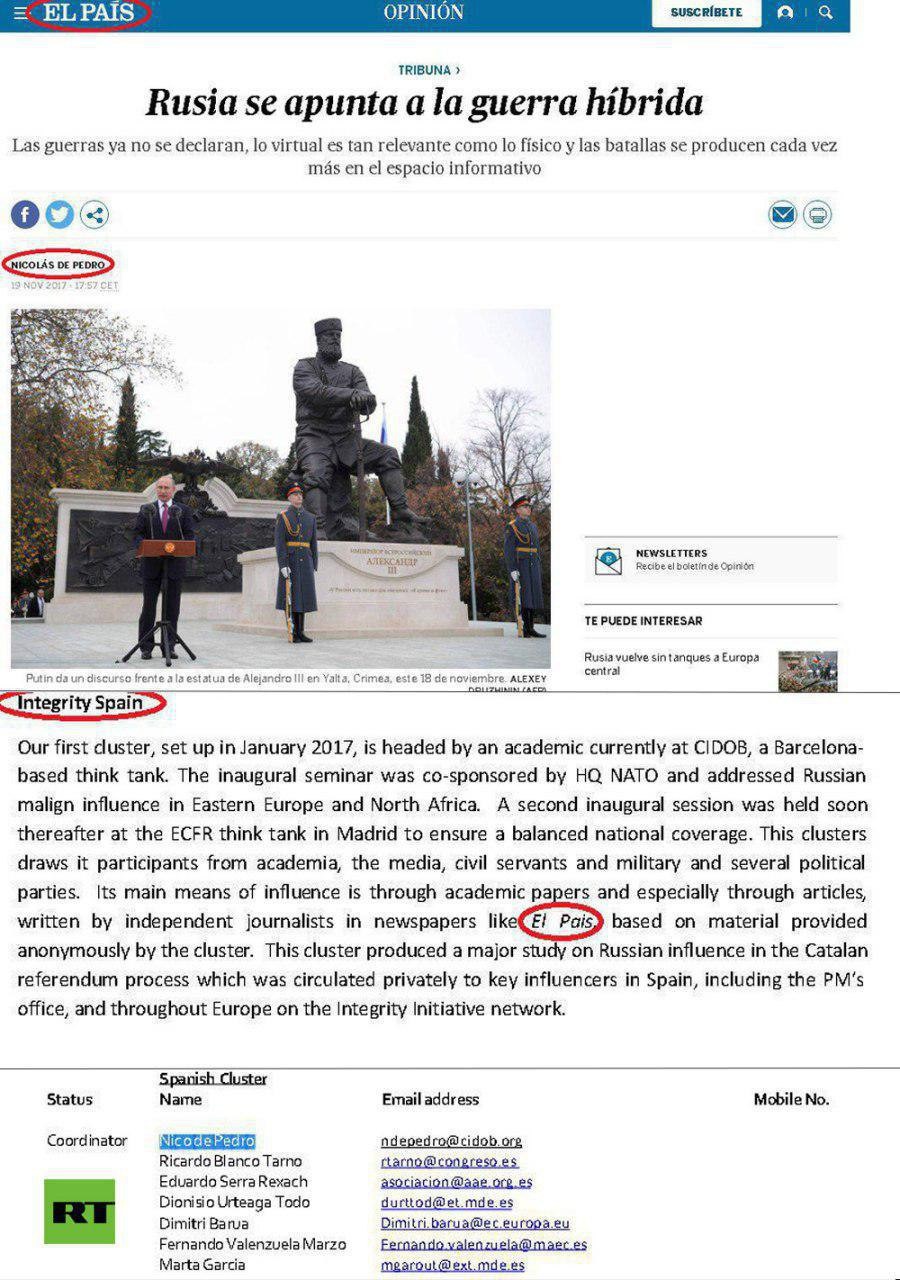According to the documents, which are laid out in the open access of hacker group Anonymous has, in 2015, the UK government launched a program Integrity Initiative. Its essence was to create so-called “clusters” of various public figures, media people, human rights activists and opinion leaders who were supposed to support anti-Russian rhetoric in their countries. Sustaining these clusters the British Foreign Office (Ministry of Foreign Affairs and Commonwealth Office) spends up to 2 million pounds per year.
The documents listed clusters in countries such as Spain, France, Germany, Italy, Greece, the Netherlands, Lithuania, Norway, Serbia and Montenegro. From budget requests published by hackers, it follows that the nearest plans of London include the creation of such pressure groups in Latvia, Moldova, the Czech Republic, Ukraine and other countries.
“All work is carried out through secret contacts in the British embassies, which gives reason to suspect the British authorities of using such pretexts to create a global network of information influence and political interference in the affairs of other states,” Anonymous said in an explanation to the documents.
Mighty "core"
The largest cluster operates in the UK itself. The document lists more than 20 names of various analysts, publicists and journalists who are designed to help the Integrity Initiative cope with the “Russian influence”.
The first on the list is William Browder, a US-British businessman convicted in absentia in Russia for tax evasion. The founder of the Hermitage Capital fund, William Browder, in 1995–2007 was considered the largest foreign portfolio investor in Russia.
In 2008, one of Hermitage Capital’s auditors, Sergei Magnitsky, was arrested on charges of creating tax evasion schemes for Browder. After 11 months, he died in prison from heart failure. Browder himself later he stated that Magnitsky allegedly revealed the facts of corruption in the Russian elite, and his death is a registered political assassination.
Subsequently, the founder of Hemiratage Capital became the main initiator of the creation of the Act on the Rule of Law and Accountability named after Sergei Magnitsky, which is also known as the “Magnitsky List”, adopted by the US Congress in December 2012.

- UK Cluster Integrity Initiative
The list of participants of the British cluster also includes the name of Vladimir Ashurkov, a former functionary of the Alfa Group consortium, as well as the executive director of the Anti-Corruption Foundation, Alexei Navalny. In 2014, Ashurkov sought political asylum in Britain after he was put on the federal wanted list as part of a theft case of 10 million rubles.
In addition, Igor Sutyagin, a military analyst convicted in 2004 of treason in favor of the United States, is in the British "core". In 2010, he was released in an exchange of prisoners between the US and Russia, which took place in Vienna, and was soon in the UK. Sutyagin is currently a senior fellow at the Royal Institute of Defense Studies in London.
Fees list
The head of the Integrity Initiative's central cluster is former Secretary General of NATO Secretary General Chris Donnelly.

- Chris Donnelly and Institute for Statecraft Payroll
In the documents made public by hackers, it is indicated that his salary as a project manager is £ 8,100 per month.
Integrity Initative, in turn, is controlled by The Insititute for Statecraft (“The Institute of Statehood”), which the British authorities have currently spent 1.961 million pounds.

- Institute for Statecraft Budget List
Experience exchange
In addition to creating clusters with similar "opinion leaders", in London Integrity Initiative is actively cooperating with other states and at the official level. Thus, in the documents discussing the Lithuanian direction of the program, it is indicated that contact was established between the 77th brigade of the British Armed Forces and the strategic communications team of the Lithuanian Armed Forces, who exchanged "methods of fighting Russian activity."
With the participation of ad hoc networks Integrity Initiative "elves" were established in Lithuania to fight the "Russian Internet trolls."
“We are funding a network of“ elves ”created to counter Russian“ trolls ”and helping other clusters to create similar organizations in their countries,” the document says.
The British Foreign Office directly states in documents that through the Lithuanian University of Vytautas Magnus can contact the Russian human rights organization Sakharov Center (formerly called the Andrei Sakharov Peace, Progress, Human Rights Community Center). With the help of the center, the British special services are counting on "getting access to Russian civil society."
Spanish "success"
As a successful example of the work of the Integrity Initiative cluster, one of the operations carried out in Spain is given. The document states that the cluster opposed the appointment of Pedro Banos, director of the Spanish National Security Department, a former colonel in the Spanish army and a security specialist, as director of the Spanish National Security Department. In the documents of the Integrity Initiative, it is called “a well-known pro-Kremlin horn” without further explanation.
The following is a detailed description of the operation - the head of the Spanish branch of the Integrity Initiative, along with the rest of the group, is preparing a special dossier to “inform” the main media in Spain. In addition, a Twitter campaign is being launched to prevent appointments.

- Report on the activities of the Spanish cell Integrity Initiative and the anti-Russian article of its leader in El Pais
The main, British, cluster, which creates a special group in the WhatsApp messenger, where it coordinates the campaign in social networks and media, soon joins the work. At the same time, the Spanish version of the StopFake website publishes an article by the head of the Spanish group, Nicolas de Pedro, which is spread by influential opinion leaders from different cells of the Integrity Initiative.
Such activities led to the fact that in the evening of the same day a number of Spanish politicians asked Prime Minister Pedro Sanchez to cancel the appointment of Banos.
In addition, the Spanish cluster, as a result of its successful work, indicated opposition to the influence of Russia on Catalonia. This activity was carried out by anonymous transfer of materials "independent journalists" for writing anti-Russian articles in various publications, such as El Pais. Thus, the newspaper housed materials for the authorship of the Spanish Integrity Initiative leader Nicolas de Pedro.
“Clear subversive activity”
It was obvious that British intelligence would work against their political rivals, hiding behind an imaginary “hybrid” Russian threat, said political scientist Alexander Asafov in an interview with RT. In his opinion, the reaction to such actions by European countries may be similar to the one that followed Edward Snowden’s revelations.
“Now negotiations are underway on brexit, and, given the pressure from Europe, which turns on the UK, the circumstances that have opened up may cause substantial claims to London by the EU member states,” the political scientist said.
As Asaph said lists of members of different clusters Integrity Initiative say that Russia really is carried out against subversion.
“People with beautiful faces, like the" innocent "Browder, whom Russia is pursuing through Interpol, gentlemen associated with the opposition, such as Ashurkov, are indeed foreign agents. They are really there for the money from the secret funds and are clearly delineated subversive activities against Russia ", - the expert believes.
Artificial reality
The British authorities will deny everything, but they will not stop conducting such operations, said political analyst Mikhail Sinelnikov-Orishak.
“Most likely, they will occupy a dull defense - they will say that this is a provocation and there is nothing like that. This phenomenon itself is known and is called astroturfing - when an artificial reality is created on the Internet. The British press wrote about this back in 2012, long before Russia's accusations of hacking and hacking. This was invented by marketers to promote certain groups of goods, and then political scientists also took over. Then, these technologies have begun to use the US military, especially during the war in Afghanistan ", - the expert said in a conversation with RT.
Artificial reality and discourses on the Internet have been used by Western countries for a long time, but in 2016 they launched a campaign to blame Russia on this, Sinelnikov-Orishak added.
“The world has the impression that everything is white and fluffy, and evil Russia has invented bots and hackers. Allegedly, the danger comes from us, although the United States and Britain were at the head of this phenomenon, as everyone knows. But this, as practice shows, is not so. It was enough to shake one bush, as bots fell from it. Now they will again deny everything and say that they invented this in the Kremlin, ”the political scientist concluded.
